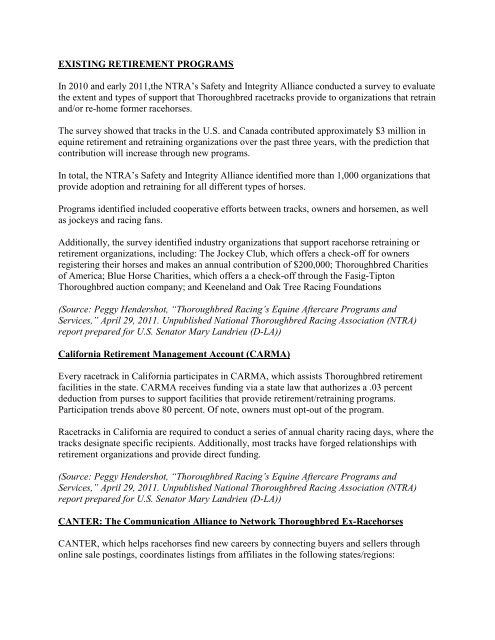Retired Racehorses
tfrr_reportandappendicesfinal
tfrr_reportandappendicesfinal
- No tags were found...
You also want an ePaper? Increase the reach of your titles
YUMPU automatically turns print PDFs into web optimized ePapers that Google loves.
EXISTING RETIREMENT PROGRAMS<br />
In 2010 and early 2011,the NTRA’s Safety and Integrity Alliance conducted a survey to evaluate<br />
the extent and types of support that Thoroughbred racetracks provide to organizations that retrain<br />
and/or re-home former racehorses.<br />
The survey showed that tracks in the U.S. and Canada contributed approximately $3 million in<br />
equine retirement and retraining organizations over the past three years, with the prediction that<br />
contribution will increase through new programs.<br />
In total, the NTRA’s Safety and Integrity Alliance identified more than 1,000 organizations that<br />
provide adoption and retraining for all different types of horses.<br />
Programs identified included cooperative efforts between tracks, owners and horsemen, as well<br />
as jockeys and racing fans.<br />
Additionally, the survey identified industry organizations that support racehorse retraining or<br />
retirement organizations, including: The Jockey Club, which offers a check-off for owners<br />
registering their horses and makes an annual contribution of $200,000; Thoroughbred Charities<br />
of America; Blue Horse Charities, which offers a a check-off through the Fasig-Tipton<br />
Thoroughbred auction company; and Keeneland and Oak Tree Racing Foundations<br />
(Source: Peggy Hendershot, “Thoroughbred Racing’s Equine Aftercare Programs and<br />
Services,” April 29, 2011. Unpublished National Thoroughbred Racing Association (NTRA)<br />
report prepared for U.S. Senator Mary Landrieu (D-LA))<br />
California Retirement Management Account (CARMA)<br />
Every racetrack in California participates in CARMA, which assists Thoroughbred retirement<br />
facilities in the state. CARMA receives funding via a state law that authorizes a .03 percent<br />
deduction from purses to support facilities that provide retirement/retraining programs.<br />
Participation trends above 80 percent. Of note, owners must opt-out of the program.<br />
Racetracks in California are required to conduct a series of annual charity racing days, where the<br />
tracks designate specific recipients. Additionally, most tracks have forged relationships with<br />
retirement organizations and provide direct funding.<br />
(Source: Peggy Hendershot, “Thoroughbred Racing’s Equine Aftercare Programs and<br />
Services,” April 29, 2011. Unpublished National Thoroughbred Racing Association (NTRA)<br />
report prepared for U.S. Senator Mary Landrieu (D-LA))<br />
CANTER: The Communication Alliance to Network Thoroughbred Ex-<strong>Racehorses</strong><br />
CANTER, which helps racehorses find new careers by connecting buyers and sellers through<br />
online sale postings, coordinates listings from affiliates in the following states/regions:


